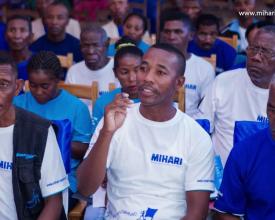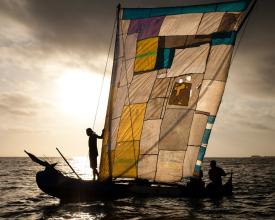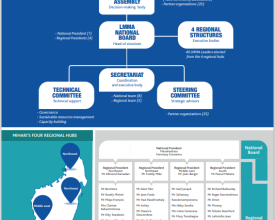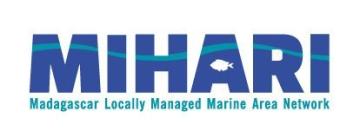
MIHARI, the first national LMMAs network in the Western Indian Ocean
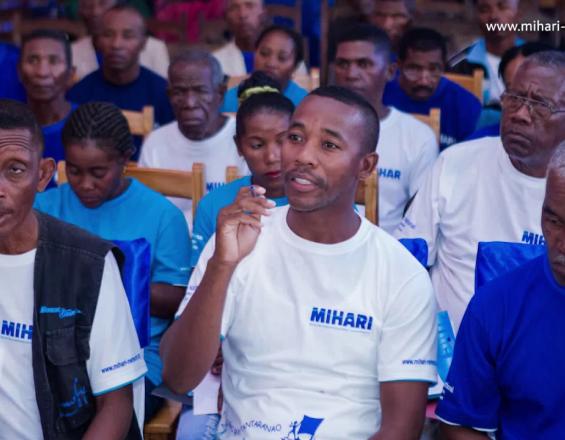
MItantana HArena Ranomasina avy eny Ifotony - MIHARI, the Locally Managed Marine Areas (LMMAs) Network of Madagascar, was created in 2012 from the initiative of 18 LMMA communities from the southwest of Madagascar. Since then, it has kept growing and evolving. The network aims at supporting the LMMAs by building local leadership, sharing best practices, securing financial sustainability and making fishers’ voices heard.
It is organised in a network structure, that allows national coordination and regional implementation.
Recently in 2020, MIHARI has become a formal entity with an independent status, that enables it to receive and manage grants directly.
The Malagasy government doesn’t have yet formally embedded an LMMA Ministerial Decree in its legislation, but it has been involved in MIHARI’s various fora and decision-making processes.
Context
Challenges addressed
- The level of education of small-scale fishers is low. It makes on the one hand the knowledge sharing a slow process, and on the other, the transmission of information from the fishers’ leaders to the other members of the communities limited.
- The remoteness of fishing communities makes mobilisation very hard, logistically, but also in terms of communication, as the villages have often no phone networks, as well as many fishers have no phone or no communication credits.
- LMMAs have no formal legal framework yet.
Location
Process
Summary of the process
The MIHARI network has on the one hand strengthened the recognition of small-scale fishers as legitimate LMMAs co-managers and parties in negotiations, thanks to the participatory design and implementation of its structure, which clarifies roles, responsibilities and accountability mechanisms. But the network and its structure would not have any wheight or legitimacy if the fishers representatives themselves were not active leaders to take part in negotiations with the government agencies. Capacity building in that sense was instrumental. And as well, the network would not have gained recognition and legitimacy in representing the rights of small-scale fishers in co-managing their resources, if MIHARI had not engaged with all concerned governmental agencies, from the beginning. Building trust with the government was essential to position MIHARI as a key actor in the policy work related to marine resources management, and especially in the development of an adequate legal framework for the LMMAs in Madagascar.
Building Blocks
Trustful relationship with the government
Since its creation, MIHARI has always involved the government authorities, at the highest level. It has made the Ministries of Agriculture, Livestock and Fisheries, as well as of Environment, visible, as they were both cited as main partners, host of conferences, etc. MIHARI has also consulted the authorities along processes, such as the formalisation of a reference guide on LMMAs, the first of this kind in the country, to be hopefully eventually integrated in the national law.
Enabling factors
- Government officials are invited in all major fora and site visits, as sponsors.
- Liaise and maintain good relationships with government officials, including Ministers.
- Collaboration in the organization of key events, such as the workshop to enhance mud crab fisheries management.
Lesson learned
It is very important to meet with government officials on a regular basis, so as to update them on ongoing and planned activities.
Implementation of the network structure
In 2015 started the consultations among all MIHARI members, to establish a clear and functioning structure. There are 45 fishers who are elected to be representatives of their region, and who meet regionally or nationally every year. They also have opportunities during these events to approach directly government officials, which has had a great impact.
Enabling factors
- Existence of community leaders who were motivated and engaged to contribute to MIHARI governance.
- Fishers trainings since the creation of MIHARI, which allowed the emergence of leaders.
Lesson learned
It was important to have a consultative process to legitimate the elected members of the national LMMA board.
Fishers' leadership enhanced
The enhanced leadership of the fishers who are elected to represent their communities in MIHARI’s different activities is vital for the network to exist as a true fishers’ movement. Their self-confidence to speak up and active participation in the discussions and consultations, support and feed the partnership between NGOs and LMMAs communities.
Enabling factors
- Capacity building in leadership, negotiations skills, public speaking.
- The fact that the MIHARI network is an official organisation, that gives small-scale fishers legitimacy to engage and take part in negotiations.
- Being an elected representative gives accountability towards one’s community.
Lesson learned
- Consultations on fishers needs, in terms of training, was important to provide the right capacity building activities.
- Learning by doing and peer-to-peer exchange were as important as formal trainings.
Impacts
Operational since 2015, MIHARI is nowadays an officially recognized national movement of small-scale fishers.
Considered as marginalised and poor, small-scale fishers are often shy and reluctant to speak up. MIHARI has invested a lot in strengthening their capacities in leadership, public speaking, negotiations and partnerships creation. It has generated a leaders’ movement with fishers’ representatives in each village and LMMA. These leaders now dare to express themselves in public, in front of the government authorities, and take part in negotiations. This has led to the adoption of three motions.
MIHARI is a membership of 219 LMMAs, ramified in 10 coastal regions out of 13. The network has enabled the emergence of small-scale fishers who are convinced of the benefits to manage their resources and have adopted their own customary law called dina, to regulate their fishing activities in their LMMA.
MIHARI has also had a critical role in convening NGOs to work together. It has generally succeeded in mobilising all key stakeholders, from government to international donors, communities’ associations and their supporting NGOs.
The LMMA approach is one of the models of co-management of natural resources in the Western Indian Ocean, that became widely known thanks to MIHARI. The network has inspired other countries, beyond the region.
Beneficiaries
- LMMAs communities engaged in their resources management
- NGOs supporting LMMAs.
Sustainable Development Goals
Story
The LMMA concept was developed in the country to enhance community led responsible resources management, since 2006. Today, an estimated 17,000 km2 of Malagasy territorial waters are under this type of management. Local communities are already recognized for their valuable contribution to marine resources management, but there is no legal framework that clearly legislates these LMMAs yet. Since 2015, the MIHARI network has been conducting advocacy work to ensure that the LMMA approach is legally recognized in Madagascar.
The LMMA concept emerged as a relevant response to several State's committments, such as the Aichi target n°11, the Promise of Sydney for tripling the MPAs and the SDG n°14 Conserve and sustainably use the oceans, seas and marine resources for sustainable development; as well as the Policy "Initiative for the Emergence of Madagascar" to ensure coastal and marine resources sustainability for the next generations.
Recently, on December 2020, MIHARI has invited representatives from different institutions and key stakeholders in marine and coastal resources management to field visits in Diana region.
Both visits have shown the successes gained and the challenges faced by the LMMAs. The discussions hold between the local communities and the institutions' representatives highlighted the achievements but also the common efforts that still need to be made, such as strengthening the local communities' engagement, harmonising field interventions, and especially securing the LMMA concept.
Following these field visits, work sessions were planned to consolidate the information related to local resources management. A gap analysis on legal aspects is also in the radar for locally led sites, that will contribute to the development of an adequate legal framework for the LMMAs.
In this process, it is important to capitalise all mechanisms of existing governance, for the different approaches to be considered in the identification of this legal framework, that would legally secure the interventions of local communities in the marine and fisheries resources.
These activities are part of a sustained effort to ensure a better future for local communities and their well managed coastal and marine resources.
(Adapted and translated from the MIHARI blog: Ensemble pour décupler l’impact positif des communautés gestionnaires de LMMA à Madagascar - Mihari Network (mihari-network.org)

